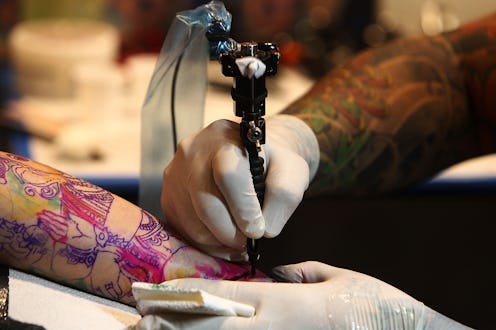Style
This New Tattoo Trend Puts Actual DNA Into Ink For The Ultimate Commitment

Adorning your body with ink dedicated to a loved one or getting a matching design with your best friend is about as intimate as a tattoo can get. That is, until now. DNA tattoos have become the latest trend to sweep the body modification sphere. And it's an inked commitment like never before.
It's already a commitment enough to tat a partner's name onto your arm or decorate your back with a portrait of a loved one that passed away. Now a process that infuses genetic cells into the ink of a tattoo exists, taking that devotion to a whole new level. Dubbed as "morbid ink", the process developed by Patrick Duffy's Endeavor Life Sciences injects a sample of DNA — from cremated ashes or a swab of someone's mouth, for example — into a tattoo, so that it may be forever persevered onto the skin.
This is nothing like those dainty micro tattoos engraved onto a couple's ring fingers or the birth order designs favored by siblings with coordinating ink. This biogenic tattoo artistry makes body art more personal than it has ever been — and it's actually borderline creepy when you really think about it.
But there's no denying that body art imbued with DNA is a pretty incredible phenomenon in the tattoo industry.
Reportedly, the process is safe because DNA samples aren't actually injected into the skin. Instead, genetic matter is captured in the ink itself.
The process works via Everence, a powdery substance synthesized from a sample of DNA, reported the New York Times. Customers mail their DNA sample to Endeavor's Quonset, R.I. laboratory where the genetic material is milled, sterilized, and encased within PMMA (a.k.a. plexiglass) capsules. A vial of Everence can be given to a tattoo artist that can mix it into any kind of ink. Rather than absorbing into the skin when tattooed onto a customer, the DNA is permanently trapped within the PMMA, so it never gets beyond the body's surface.
That kind of science certainly comes at a steep price. Everence currently sells for $650, which includes a kit to retrieve the DNA, the process of producing the powder, and the return to the customer months later. Initially, Everence will accept a limited amount of pre-orders and even offer payment plans, reported the New York Times.
Long practiced by underground artists, "morbid ink" isn't exactly a new concept. For example, Skin46 is among DNA tattoo pioneers, using hair samples to create biogenic tattoos. Their fundraising efforts on Kickstarter were wildly successful in 2016.
With four years in the making, Everence is in a lane of its own, however, making tattoos incredibly meaningful without the risk of actually compromising the immune system. Still, the practice isn't without risks. Considered as cosmetic, tattoo ink isn't regulated by the FDA, although the agency warns consumers of risks associated with tattooing, such as infection and allergic reactions.
That doesn't stop those interested in a relic of a tattoo from taking interest in Everence. As reported by the New York Times, Endeavor has already found tattoo artists willing to ink DNA onto their skin and others. And there are even medical professionals endorsing the practice as safe as traditional tattoo ink. So, it looks like biogenic tattoos may soon rise in popularity.
As eerie as it sounds, it's quite a special way to honor that special someone. Genetic material doesn't even have to come from a human, so these intimate tats can honor furry friends, too. Far from a traditional tattoo, biogenic ink is probably as close as you can physically get to a loved one — and it's weirdly amazing.